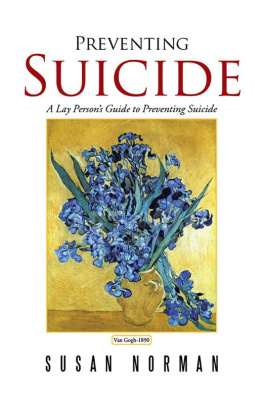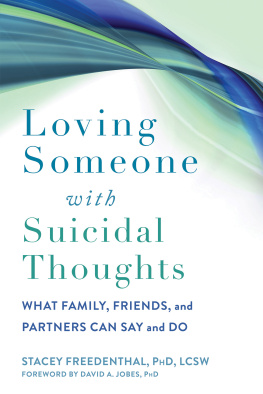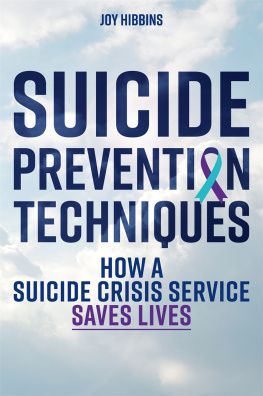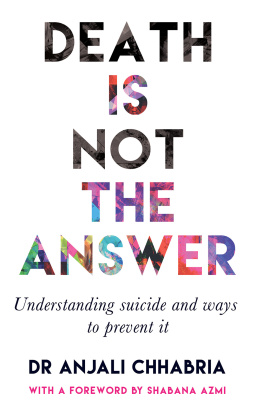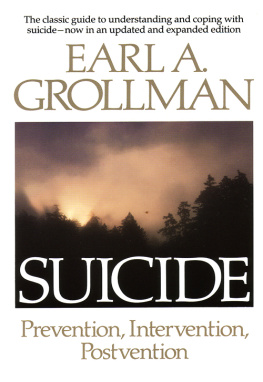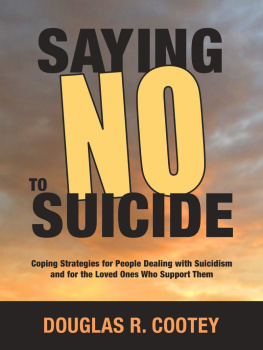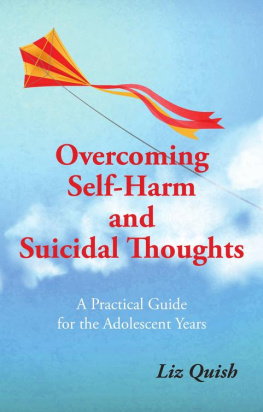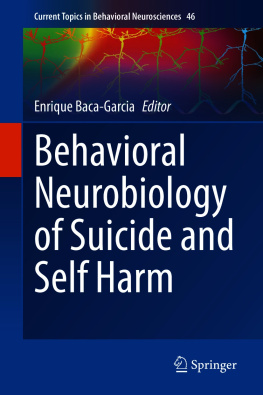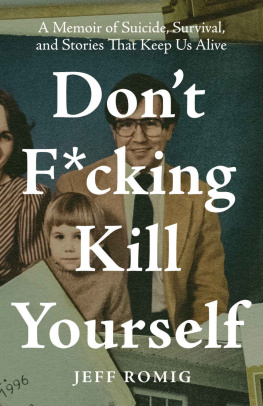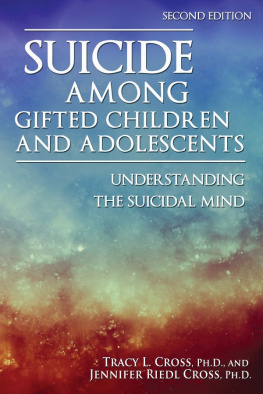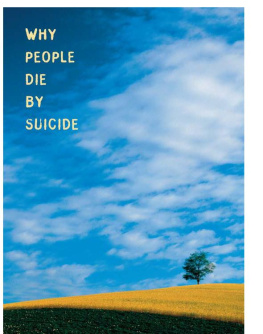Preventing Suicide
A Lay Persons Guide to Preventing Suicide
Susan Norman
Copyright 2016 by Susan Norman.
ISBN: Softcover 978-1-5245-0761-9
eBook 978-1-5245-0760-2
All rights reserved. No part of this book may be reproduced or transmitted in any form or by any means, electronic or mechanical, including photocopying, recording, or by any information storage and retrieval system, without permission in writing from the copyright owner.
Any people depicted in stock imagery provided by Thinkstock are models, and such images are being used for illustrative purposes only.
Certain stock imagery Thinkstock.
Rev. date: 06/14/2016
Xlibris
1-888-795-4274
www.Xlibris.com
743480
Contents
Part 1
Introduction 1
Part 2
Getting The Help You Need
May 17, 2016
Preventing Suicide by Susan Jeanne Norman
A Laypersons Guide to Preventing Suicide for Oneself and Loved One
Dedication: This workbook is dedicated to Dr. Frances Perry, in Bowling Green, Ohio. She is the person that made me make A Vow which I delineate later. She saved my life when I needed to have it saved. God Bless her.
Part 1
Introduction 1
If you are presently immersed in suicidal ideation or thinking, get help immediately! This book has a lot of information intended to help you through this terrible situation but if you are already there, get help. Call a Crisis Line, Suicide Hotline, a doctor, or psychologist, a friend, parent, grandparent, someone in your life that you know cares about you. Ask for help and take it when they give it to you. You are worth it!
What can we do as loved ones, family, neighbors, as a community to help people prevent suicide? Suicide numbers are up in certain groups, especially young people, the elderly, and increasingly our armed services personnel overseas. How can we be in the right place at the right time to help someone out of this terrible corner they have painted themselves into?
My heart has broken every time I have gone to a funeral or memorial service for someone I knew that took their own life. What could I have done? How could I be there for someone else before they reach the very end, give up to the demons within them?
In my heart of hearts I believe surely there is something that I could have done. I, for one, would have been happy to go and get the person and talked with them, taken them out for coffee at 2 a.m. to get him or her out of their own negative spiral downward.
So this workbook is written with love for those who may be in that dangerous place themselves or know someone else who is. To do something is better than doing nothing.
While the first and foremost goal of this book is to help you prevent suicide in yourself or someone else, once you have avoided suicide you must then get well again so that when things get bad for you again, as they are likely to do in everyones life at some time or other, suicide is not an option, that you have real usable coping skills to get you through.
I am writing this book as a person who has avoided suicide for myself after two attempts when I was in my 20s and 30s. That has me pegged as a high risk group. I am now 61 years old and have prevented myself from killing myself over thirty plus years.
I am not a licensed therapist, psychologist or psychiatrist. I believe that people in these professions are essential to preventing suicides and I encourage people to find a very good counselor that will help them. I have had two in my life that through working through serious issues in my life, have helped me avoid killing myself.
I am a lay person, who, by my definition, is a person who has experience and insight into this acutely painful issue in many peoples lives, and may be able to share something helpful for you in your situation. I want to reiterate that I am not a licensed professional, and that should you need professional help you are encouraged to get it right away. Time is of the essence. Obsessing on suicide puts it forward in your mind and puts you at further risk. If you are in this space, get help immediately! You are worth it!
I did not do this on my own. I had a strong support network of friends, family and counselors over the years and all of them together have taught me how to hang on to life. So I have had a team of people that helped me. Start putting together your own team. These folks may save you when you need it most. Have them make an accountability pact with you and you make one with them. Write down or journalize your goals and how you will attain them.
I have lived through the suicides of some friends, acquaintances, and co-workers. My thoughts and experiences in the aftermath have always centered on What could I have done for these people that others did not do? What could I have done? As a proactive person, I believe there is something that can be done in terrible situations. The question is what is the best action for the circumstances? How can the suicidal person be treated with the greatest amount of respect possible in their process of protecting their life and moving on from there? This is a life and death situation and any person attempting suicide is by nature going to be scarred in some way by the experience. The key is to help them pick themselves back up and move on with their lives.
In this book I am going to set up some questions that you can journalize for yourself. I encourage you to take the time at the end of each chapter to discover where you or your loved ones are on these issues. These notes can be a starting point in discussions with a therapist of your choice.
I am writing to encourage you to not take your life and if you have someone in your life who is at risk to have some tools and ideas at hand to help you help them through this terrible time. While you may have heard of several things I am going to mention, I am trusting that this information may be new to someone who really needs it.
I want to impress on my readers, too, that this can be a time when you go deep inside yourself and bring up your most creative self to deal with potential suicide. The circumstances leading up to suicide can be as unique as the individual involved and the ways out of thinking about it, obsessing about it can be as creative as you are too. Your creativity can become a badge of honor, showing yourself and your loved ones your potential in working this problem out to ultimately prevent suicide. That is my hope and prayer for all of you, and my reason for sharing all of this.
Questions to journalize:
Where are you today on the question of suicide?
Are you having suicidal ideation right now or in the recent past? Do you have a plan for committing suicide? Do you have a plan for preventing suicide? Yours or someone elses?
What do you need to get out of reading this book?
Chapter 1
Who I Am And Where I Am Coming From
I think that people go through times in their lives when their life is threatened. Anything can set off a deepening spiral downward such as a loss of job, spouse, relationship, financial set backs and other life changing events. Some people manage to get through this time with skills they have and relationships they have developed, through their faith or other connections. But some people lose hope for their lives and then they begin to think things will never change and that they and others would be better off if they were dead.
I went through a long period of depression in my life. I had some life experiences that were, at times, seemingly hopeless.
I was born with a visible birth defect over my left eye. It was a tumor that was benign but grew slowly, that eventually destroyed my left eye which was exonerated in 1969, the summer before I entered high school.
When I was young people seemed to ask me all the time what was wrong with my eye. It made me feel ashamed and humiliated. I had no answer for them since it had always been with me. I spent years in doctors and specialists offices but there was little they could do.
Next page
